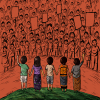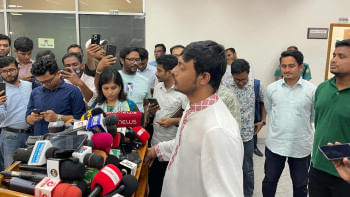Attacks on the Mro damage the dignity of Bangladesh
One of the reasons that make Bangladesh such a beautiful and diverse nation is the people from all different ethnicities who live here. In a cultural affairs ministry gazette published on March 23, 2019, the government said that there are people from 50 different ethnicities living in Bangladesh.
The culture, development, democracy and humanity of a country are measured by how its religious, ethnic and other minorities fare. However, in the beginning of the new year, on January 2, we sadly witnessed an attack on the Mro community in Bandarban's Lama. Their houses were burned and vandalised, and its inhabitants were assaulted. This happened last year too, but there was no redress.

A repeated complaint is that the land that the Mro people live on is apparently not theirs. We know that if one owns the land, they have to have the title to it. However, Indigenous people around the world do not have such titles because they have been living in these lands, forests and hills for generations. They have what is called customary rights. These customary or ancestral rights to land are recognised by international law. The Bangladesh government, too, ratified the ILO Convention on Indigenous and Tribal Populations in 1972. This means that the Indigenous people living on our lands, hills and forests have ancestral rights to the land they live on too, and their rights are recognised.
The Mro people were attacked in April last year, and their crops on the 400-acre land were burnt down. Their main water source was also poisoned, and their banana orchard was cut down. Despite meetings with the administration about this, the Indigenous people's rights were disregarded, and the land was given out on lease to some influential quarters. If the land rights of the Indigenous community were properly recognised, then this lease would be illegal.

The UN adopted the Declaration on the Rights of Indigenous Peoples (UNDRIP) in 2007. Before that, in 1992, it adopted the Declaration on the Rights of Persons Belonging to National or Ethnic, Religious and Linguistic Minorities. Just like any minority in any other country of the world, the Mro people and other Indigenous groups of Bangladesh are minorities who these declarations apply to. And securing their rights and upholding their dignity is the responsibility of the state.
The state must prove that it supports its oppressed people and will act against the people who attack minorities. That is the hallmark of a developed and civilised nation. However, we are sadly continuing to witness human rights violations of Indigenous peoples around the world, and in Bangladesh too.
Dr Abul Barkat has a book titled "Political Economy of Unpeopling of Indigenous Peoples", in which he shows that Bangladesh is gradually losing its minority population. Some are going abroad, and some are getting displaced, including Indigenous people, who are being displaced from the forests and hills that they consider to be their ancestral homes. This, in turn, is depriving them of their right to a livelihood.
In 2008, this government made a lot of promises before coming into power. I hope that they will keep their promises and protect the rights of minorities, including Indigenous communities, and ensure their rights to their land. There must be a functional land commission that will effectively work to resolve these land issues. And the promise of establishing a minority commission must be fulfilled very soon.
In any case, a piece of good news for the Mros is that representatives of the National Human Rights Commission have gone to Lama and listened to the community's grievances. This gives us hope that a crucial dialogue could take place at the higher echelons of the government, and concrete policies and steps will then be taken to solve the land crisis of the Mro people. The state must also ensure exemplary punishment for those who have repeatedly attacked the Mro people. That is the only way the cultural and ethnic diversity of our nation can be protected.
We should always consider our diversity as a source of strength, not weakness. The 50 ethnic groups living in Bangladesh are an integral part of the nation. We know that people from these communities gave their lives to protect their motherland during the Liberation War of 1971. And after 51 years of independence, it is time for us to adopt a national policy on Indigenous people, like the ones that exist in many other countries. And there should be a government order saying that until the land crisis has been solved, nobody can disturb Indigenous people on their ancestral land. No for-profit company or individual, or even the government, should be able to undertake projects on their land without discussions with them first.
When incidents like the most recent attack take place, and the stories and pictures of the attack come out in the media, the dignity of our state is damaged. It brings us shame as a nation. The government must be proactive in standing beside Indigenous communities in these cases, even if they do not come forward to file a case for whatever reason. My hope for the new year is that this culture will be nourished in the country.
Sanjeeb Drong is the general secretary of Bangladesh Adivasi Forum.

 For all latest news, follow The Daily Star's Google News channel.
For all latest news, follow The Daily Star's Google News channel. 










Comments